Research Proposal: Digitalisation Impact on the Hospitality Industry
VerifiedAdded on 2023/06/04
|15
|3852
|120
Report
AI Summary
This research proposal investigates the impact of digitalization on the tourism and hospitality industry, specifically focusing on Premier Inn. It examines the background of the research, the organization, and outlines the research aims and objectives, including identifying the effective use of digitalization, analyzing challenges faced by Premier Inn, determining strategies to overcome these challenges, and identifying the future of digitalization in the industry. The proposal also details the research questions, problem statement, and rationale, followed by a literature review covering the effective use of digitalization, challenges, strategies, and the future of digitalization in the hospitality sector. The methodology section outlines the research philosophy (positivism), approach, strategy, data collection methods, time horizons, ethical considerations, validity, limitations, and the research plan. The proposal aims to provide a comprehensive analysis of digitalization's impact on Premier Inn and the broader UK hospitality sector.
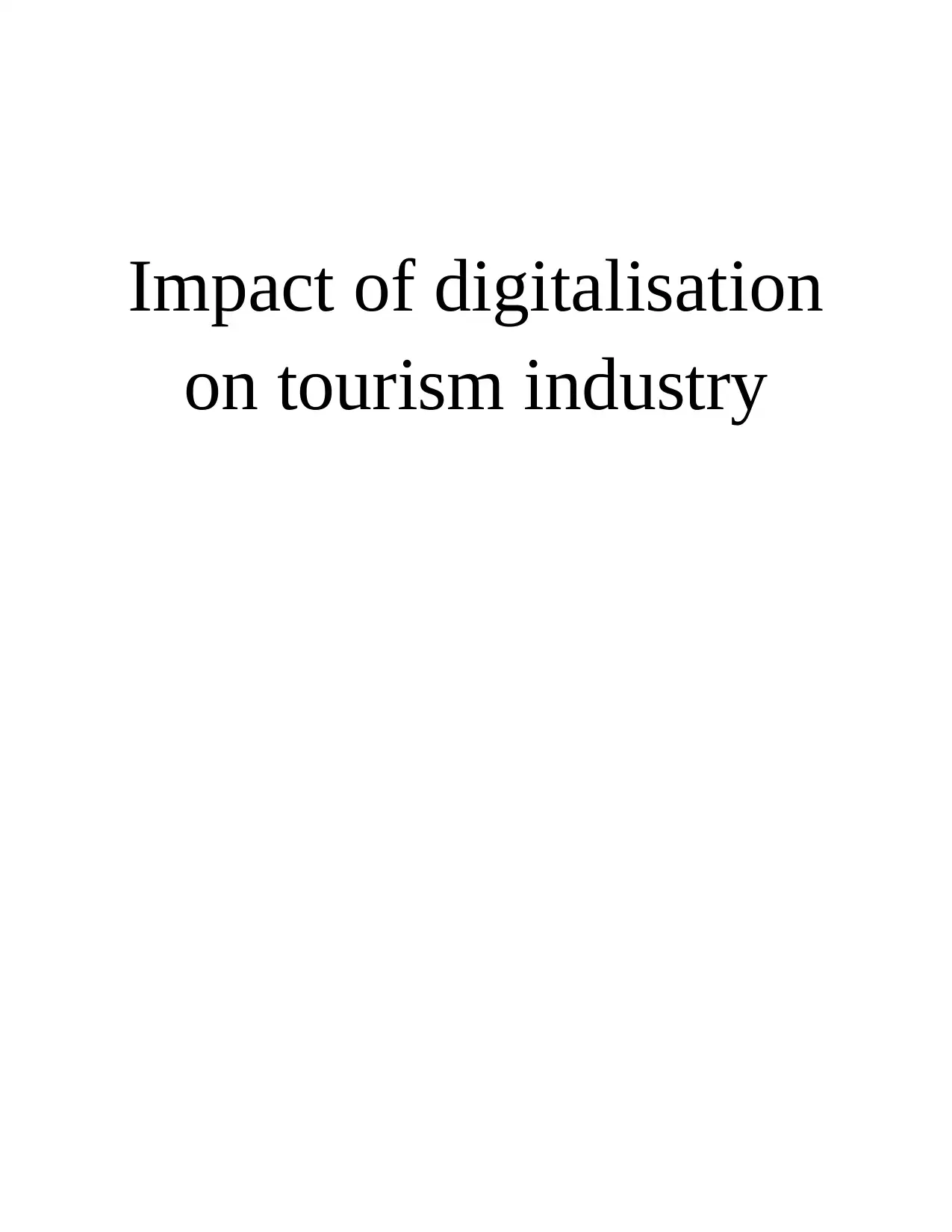
Impact of digitalisation
on tourism industry
on tourism industry
Paraphrase This Document
Need a fresh take? Get an instant paraphrase of this document with our AI Paraphraser
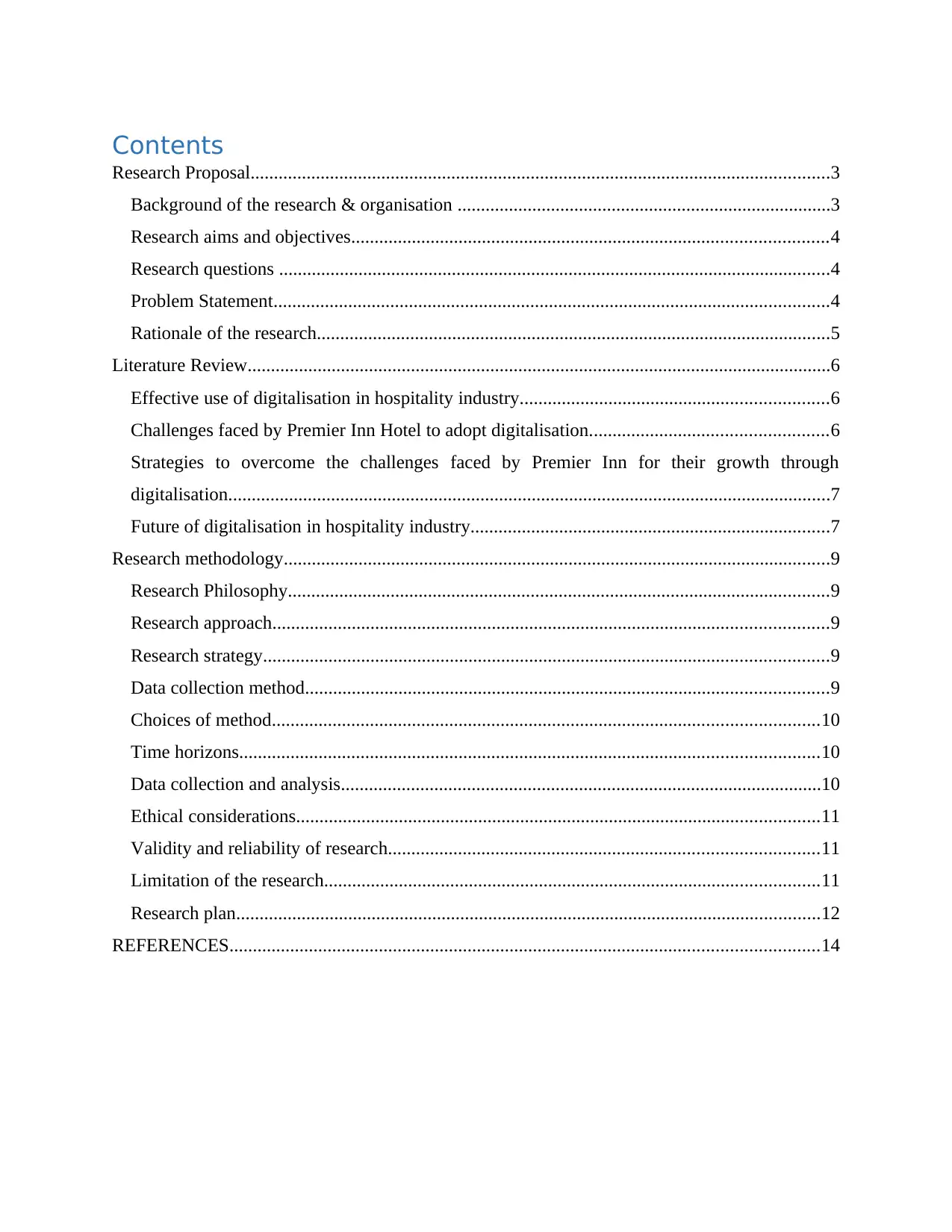
Contents
Research Proposal............................................................................................................................3
Background of the research & organisation ................................................................................3
Research aims and objectives......................................................................................................4
Research questions ......................................................................................................................4
Problem Statement.......................................................................................................................4
Rationale of the research..............................................................................................................5
Literature Review.............................................................................................................................6
Effective use of digitalisation in hospitality industry..................................................................6
Challenges faced by Premier Inn Hotel to adopt digitalisation...................................................6
Strategies to overcome the challenges faced by Premier Inn for their growth through
digitalisation.................................................................................................................................7
Future of digitalisation in hospitality industry.............................................................................7
Research methodology.....................................................................................................................9
Research Philosophy....................................................................................................................9
Research approach.......................................................................................................................9
Research strategy.........................................................................................................................9
Data collection method................................................................................................................9
Choices of method.....................................................................................................................10
Time horizons............................................................................................................................10
Data collection and analysis.......................................................................................................10
Ethical considerations................................................................................................................11
Validity and reliability of research............................................................................................11
Limitation of the research..........................................................................................................11
Research plan.............................................................................................................................12
REFERENCES..............................................................................................................................14
Research Proposal............................................................................................................................3
Background of the research & organisation ................................................................................3
Research aims and objectives......................................................................................................4
Research questions ......................................................................................................................4
Problem Statement.......................................................................................................................4
Rationale of the research..............................................................................................................5
Literature Review.............................................................................................................................6
Effective use of digitalisation in hospitality industry..................................................................6
Challenges faced by Premier Inn Hotel to adopt digitalisation...................................................6
Strategies to overcome the challenges faced by Premier Inn for their growth through
digitalisation.................................................................................................................................7
Future of digitalisation in hospitality industry.............................................................................7
Research methodology.....................................................................................................................9
Research Philosophy....................................................................................................................9
Research approach.......................................................................................................................9
Research strategy.........................................................................................................................9
Data collection method................................................................................................................9
Choices of method.....................................................................................................................10
Time horizons............................................................................................................................10
Data collection and analysis.......................................................................................................10
Ethical considerations................................................................................................................11
Validity and reliability of research............................................................................................11
Limitation of the research..........................................................................................................11
Research plan.............................................................................................................................12
REFERENCES..............................................................................................................................14
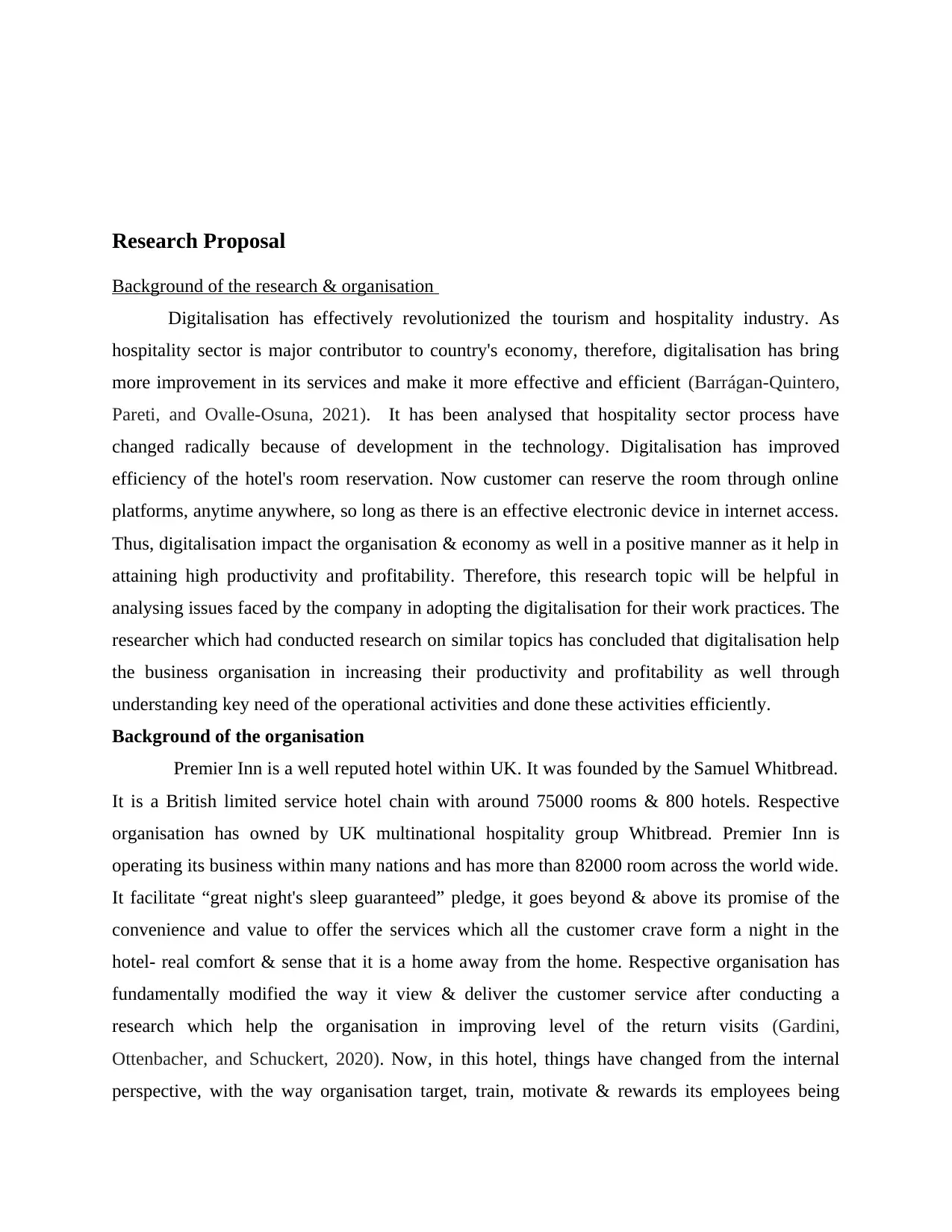
Research Proposal
Background of the research & organisation
Digitalisation has effectively revolutionized the tourism and hospitality industry. As
hospitality sector is major contributor to country's economy, therefore, digitalisation has bring
more improvement in its services and make it more effective and efficient (Barrágan-Quintero,
Pareti, and Ovalle-Osuna, 2021). It has been analysed that hospitality sector process have
changed radically because of development in the technology. Digitalisation has improved
efficiency of the hotel's room reservation. Now customer can reserve the room through online
platforms, anytime anywhere, so long as there is an effective electronic device in internet access.
Thus, digitalisation impact the organisation & economy as well in a positive manner as it help in
attaining high productivity and profitability. Therefore, this research topic will be helpful in
analysing issues faced by the company in adopting the digitalisation for their work practices. The
researcher which had conducted research on similar topics has concluded that digitalisation help
the business organisation in increasing their productivity and profitability as well through
understanding key need of the operational activities and done these activities efficiently.
Background of the organisation
Premier Inn is a well reputed hotel within UK. It was founded by the Samuel Whitbread.
It is a British limited service hotel chain with around 75000 rooms & 800 hotels. Respective
organisation has owned by UK multinational hospitality group Whitbread. Premier Inn is
operating its business within many nations and has more than 82000 room across the world wide.
It facilitate “great night's sleep guaranteed” pledge, it goes beyond & above its promise of the
convenience and value to offer the services which all the customer crave form a night in the
hotel- real comfort & sense that it is a home away from the home. Respective organisation has
fundamentally modified the way it view & deliver the customer service after conducting a
research which help the organisation in improving level of the return visits (Gardini,
Ottenbacher, and Schuckert, 2020). Now, in this hotel, things have changed from the internal
perspective, with the way organisation target, train, motivate & rewards its employees being
Background of the research & organisation
Digitalisation has effectively revolutionized the tourism and hospitality industry. As
hospitality sector is major contributor to country's economy, therefore, digitalisation has bring
more improvement in its services and make it more effective and efficient (Barrágan-Quintero,
Pareti, and Ovalle-Osuna, 2021). It has been analysed that hospitality sector process have
changed radically because of development in the technology. Digitalisation has improved
efficiency of the hotel's room reservation. Now customer can reserve the room through online
platforms, anytime anywhere, so long as there is an effective electronic device in internet access.
Thus, digitalisation impact the organisation & economy as well in a positive manner as it help in
attaining high productivity and profitability. Therefore, this research topic will be helpful in
analysing issues faced by the company in adopting the digitalisation for their work practices. The
researcher which had conducted research on similar topics has concluded that digitalisation help
the business organisation in increasing their productivity and profitability as well through
understanding key need of the operational activities and done these activities efficiently.
Background of the organisation
Premier Inn is a well reputed hotel within UK. It was founded by the Samuel Whitbread.
It is a British limited service hotel chain with around 75000 rooms & 800 hotels. Respective
organisation has owned by UK multinational hospitality group Whitbread. Premier Inn is
operating its business within many nations and has more than 82000 room across the world wide.
It facilitate “great night's sleep guaranteed” pledge, it goes beyond & above its promise of the
convenience and value to offer the services which all the customer crave form a night in the
hotel- real comfort & sense that it is a home away from the home. Respective organisation has
fundamentally modified the way it view & deliver the customer service after conducting a
research which help the organisation in improving level of the return visits (Gardini,
Ottenbacher, and Schuckert, 2020). Now, in this hotel, things have changed from the internal
perspective, with the way organisation target, train, motivate & rewards its employees being
⊘ This is a preview!⊘
Do you want full access?
Subscribe today to unlock all pages.

Trusted by 1+ million students worldwide

overhauled at every level within workplace, meaning insights team or workforce has earned its
place at table for the strategic decision.
Research aims and objectives
Research aim- "To analyse the impact of digitalisation in context of UK hospitality industry"- A
study of Premier Inn Hotel.
Research objectives
To identify the effective use of digitalisation in hospitality industry.
To analyse the challenges faced by Premier Inn hotel to adopt digitalisation.
To determine the strategies to overcome the challenges faced by Premier Inn for their
growth through digitalisation.
To identify the future of digitalisation in hospitality industry.
Research questions
What are effective use of the digitalisation within hospitality industry?
What are key challenges faced by the Premier Inn hotel to adopt digitalisation?
How to overcome the challenges faced by Premier Inn for their growth through
digitalisation?
What is future of the digitalisation within hospitality industry?
Problem Statement
Managing digitalization within an organisation is one of the biggest issues for a company
especially in hospitality sector. It is tough for a company to analyse which type of tools and
technology is beneficial for them to enhance their productivity and profitability. On the other
hand, it is also essential for hotels and resorts to train their employees well and make them
understand the ways they can use the technology for organisational benefit (Hassan, Muneeza,
and Khan, 2021). There are various kinds of issues which can be faced by Premier Inn Hotels
and Resorts while adopting diagonalization, first is to analyse the current trend in market. It is
essential for the Premier Inn Hotels to analyse which technology will help them to satisfy their
customers and matches to their main operations. Secondly, they are also required to adopt
technology within a fixed budget. It should not happen that they will spend unlimited money to
place at table for the strategic decision.
Research aims and objectives
Research aim- "To analyse the impact of digitalisation in context of UK hospitality industry"- A
study of Premier Inn Hotel.
Research objectives
To identify the effective use of digitalisation in hospitality industry.
To analyse the challenges faced by Premier Inn hotel to adopt digitalisation.
To determine the strategies to overcome the challenges faced by Premier Inn for their
growth through digitalisation.
To identify the future of digitalisation in hospitality industry.
Research questions
What are effective use of the digitalisation within hospitality industry?
What are key challenges faced by the Premier Inn hotel to adopt digitalisation?
How to overcome the challenges faced by Premier Inn for their growth through
digitalisation?
What is future of the digitalisation within hospitality industry?
Problem Statement
Managing digitalization within an organisation is one of the biggest issues for a company
especially in hospitality sector. It is tough for a company to analyse which type of tools and
technology is beneficial for them to enhance their productivity and profitability. On the other
hand, it is also essential for hotels and resorts to train their employees well and make them
understand the ways they can use the technology for organisational benefit (Hassan, Muneeza,
and Khan, 2021). There are various kinds of issues which can be faced by Premier Inn Hotels
and Resorts while adopting diagonalization, first is to analyse the current trend in market. It is
essential for the Premier Inn Hotels to analyse which technology will help them to satisfy their
customers and matches to their main operations. Secondly, they are also required to adopt
technology within a fixed budget. It should not happen that they will spend unlimited money to
Paraphrase This Document
Need a fresh take? Get an instant paraphrase of this document with our AI Paraphraser
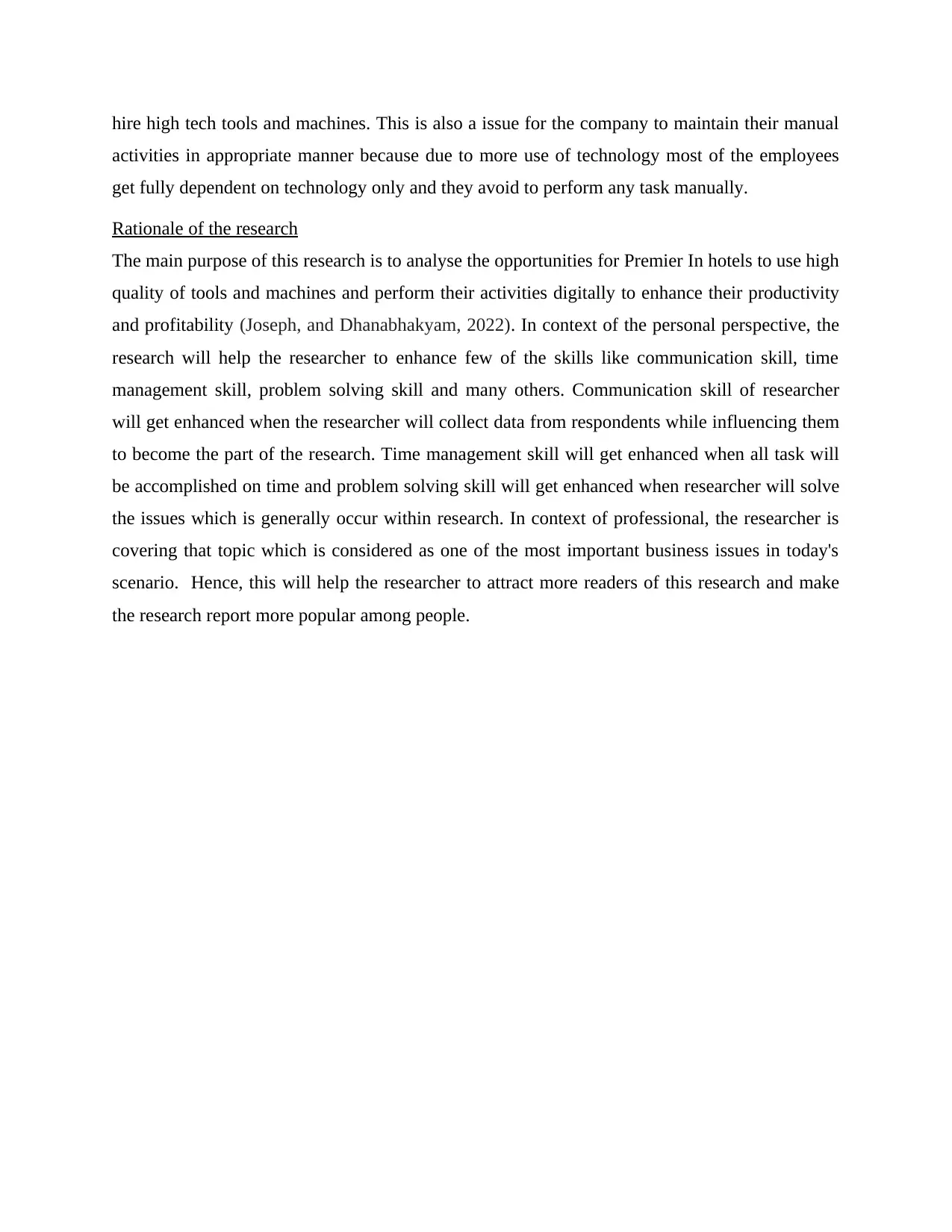
hire high tech tools and machines. This is also a issue for the company to maintain their manual
activities in appropriate manner because due to more use of technology most of the employees
get fully dependent on technology only and they avoid to perform any task manually.
Rationale of the research
The main purpose of this research is to analyse the opportunities for Premier In hotels to use high
quality of tools and machines and perform their activities digitally to enhance their productivity
and profitability (Joseph, and Dhanabhakyam, 2022). In context of the personal perspective, the
research will help the researcher to enhance few of the skills like communication skill, time
management skill, problem solving skill and many others. Communication skill of researcher
will get enhanced when the researcher will collect data from respondents while influencing them
to become the part of the research. Time management skill will get enhanced when all task will
be accomplished on time and problem solving skill will get enhanced when researcher will solve
the issues which is generally occur within research. In context of professional, the researcher is
covering that topic which is considered as one of the most important business issues in today's
scenario. Hence, this will help the researcher to attract more readers of this research and make
the research report more popular among people.
activities in appropriate manner because due to more use of technology most of the employees
get fully dependent on technology only and they avoid to perform any task manually.
Rationale of the research
The main purpose of this research is to analyse the opportunities for Premier In hotels to use high
quality of tools and machines and perform their activities digitally to enhance their productivity
and profitability (Joseph, and Dhanabhakyam, 2022). In context of the personal perspective, the
research will help the researcher to enhance few of the skills like communication skill, time
management skill, problem solving skill and many others. Communication skill of researcher
will get enhanced when the researcher will collect data from respondents while influencing them
to become the part of the research. Time management skill will get enhanced when all task will
be accomplished on time and problem solving skill will get enhanced when researcher will solve
the issues which is generally occur within research. In context of professional, the researcher is
covering that topic which is considered as one of the most important business issues in today's
scenario. Hence, this will help the researcher to attract more readers of this research and make
the research report more popular among people.
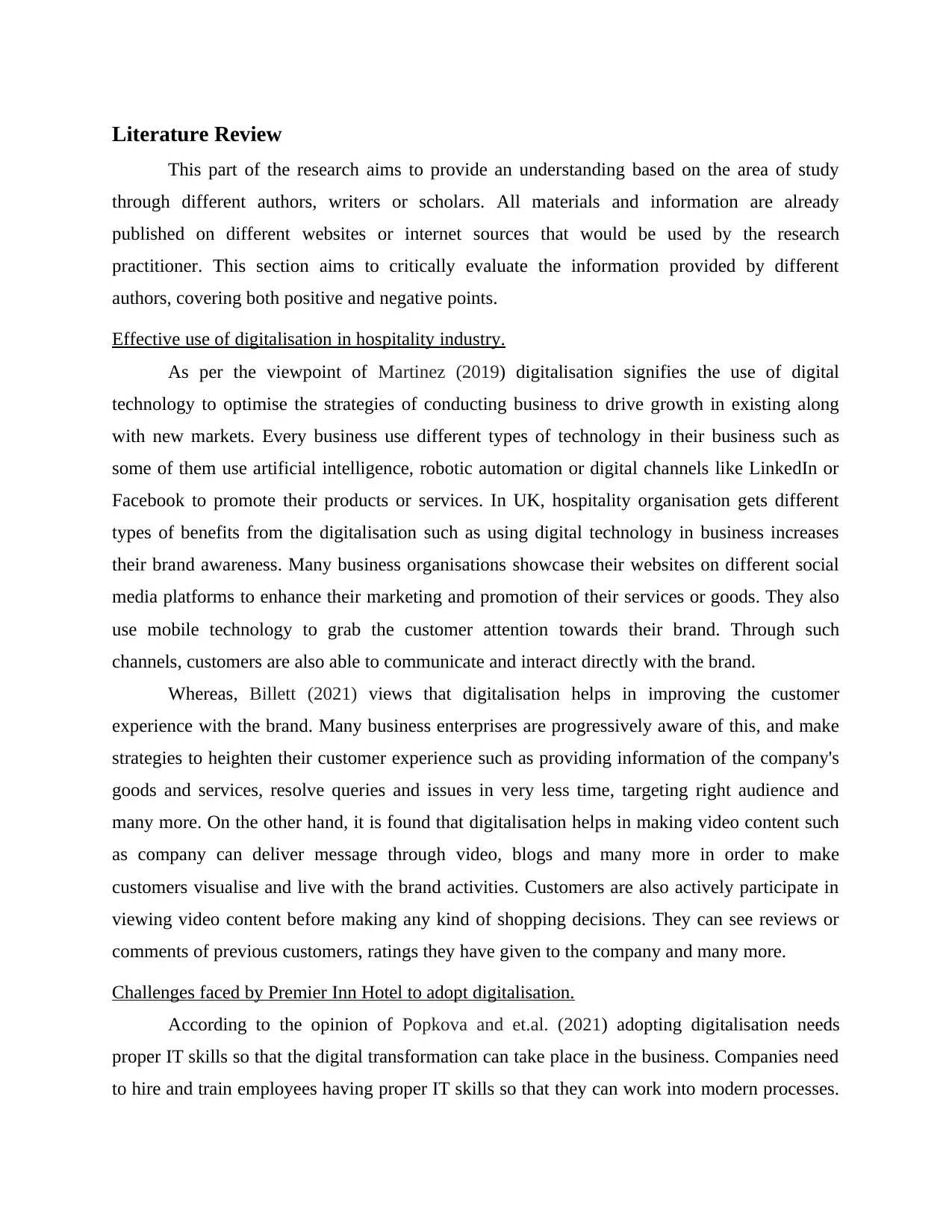
Literature Review
This part of the research aims to provide an understanding based on the area of study
through different authors, writers or scholars. All materials and information are already
published on different websites or internet sources that would be used by the research
practitioner. This section aims to critically evaluate the information provided by different
authors, covering both positive and negative points.
Effective use of digitalisation in hospitality industry.
As per the viewpoint of Martinez (2019) digitalisation signifies the use of digital
technology to optimise the strategies of conducting business to drive growth in existing along
with new markets. Every business use different types of technology in their business such as
some of them use artificial intelligence, robotic automation or digital channels like LinkedIn or
Facebook to promote their products or services. In UK, hospitality organisation gets different
types of benefits from the digitalisation such as using digital technology in business increases
their brand awareness. Many business organisations showcase their websites on different social
media platforms to enhance their marketing and promotion of their services or goods. They also
use mobile technology to grab the customer attention towards their brand. Through such
channels, customers are also able to communicate and interact directly with the brand.
Whereas, Billett (2021) views that digitalisation helps in improving the customer
experience with the brand. Many business enterprises are progressively aware of this, and make
strategies to heighten their customer experience such as providing information of the company's
goods and services, resolve queries and issues in very less time, targeting right audience and
many more. On the other hand, it is found that digitalisation helps in making video content such
as company can deliver message through video, blogs and many more in order to make
customers visualise and live with the brand activities. Customers are also actively participate in
viewing video content before making any kind of shopping decisions. They can see reviews or
comments of previous customers, ratings they have given to the company and many more.
Challenges faced by Premier Inn Hotel to adopt digitalisation.
According to the opinion of Popkova and et.al. (2021) adopting digitalisation needs
proper IT skills so that the digital transformation can take place in the business. Companies need
to hire and train employees having proper IT skills so that they can work into modern processes.
This part of the research aims to provide an understanding based on the area of study
through different authors, writers or scholars. All materials and information are already
published on different websites or internet sources that would be used by the research
practitioner. This section aims to critically evaluate the information provided by different
authors, covering both positive and negative points.
Effective use of digitalisation in hospitality industry.
As per the viewpoint of Martinez (2019) digitalisation signifies the use of digital
technology to optimise the strategies of conducting business to drive growth in existing along
with new markets. Every business use different types of technology in their business such as
some of them use artificial intelligence, robotic automation or digital channels like LinkedIn or
Facebook to promote their products or services. In UK, hospitality organisation gets different
types of benefits from the digitalisation such as using digital technology in business increases
their brand awareness. Many business organisations showcase their websites on different social
media platforms to enhance their marketing and promotion of their services or goods. They also
use mobile technology to grab the customer attention towards their brand. Through such
channels, customers are also able to communicate and interact directly with the brand.
Whereas, Billett (2021) views that digitalisation helps in improving the customer
experience with the brand. Many business enterprises are progressively aware of this, and make
strategies to heighten their customer experience such as providing information of the company's
goods and services, resolve queries and issues in very less time, targeting right audience and
many more. On the other hand, it is found that digitalisation helps in making video content such
as company can deliver message through video, blogs and many more in order to make
customers visualise and live with the brand activities. Customers are also actively participate in
viewing video content before making any kind of shopping decisions. They can see reviews or
comments of previous customers, ratings they have given to the company and many more.
Challenges faced by Premier Inn Hotel to adopt digitalisation.
According to the opinion of Popkova and et.al. (2021) adopting digitalisation needs
proper IT skills so that the digital transformation can take place in the business. Companies need
to hire and train employees having proper IT skills so that they can work into modern processes.
⊘ This is a preview!⊘
Do you want full access?
Subscribe today to unlock all pages.

Trusted by 1+ million students worldwide
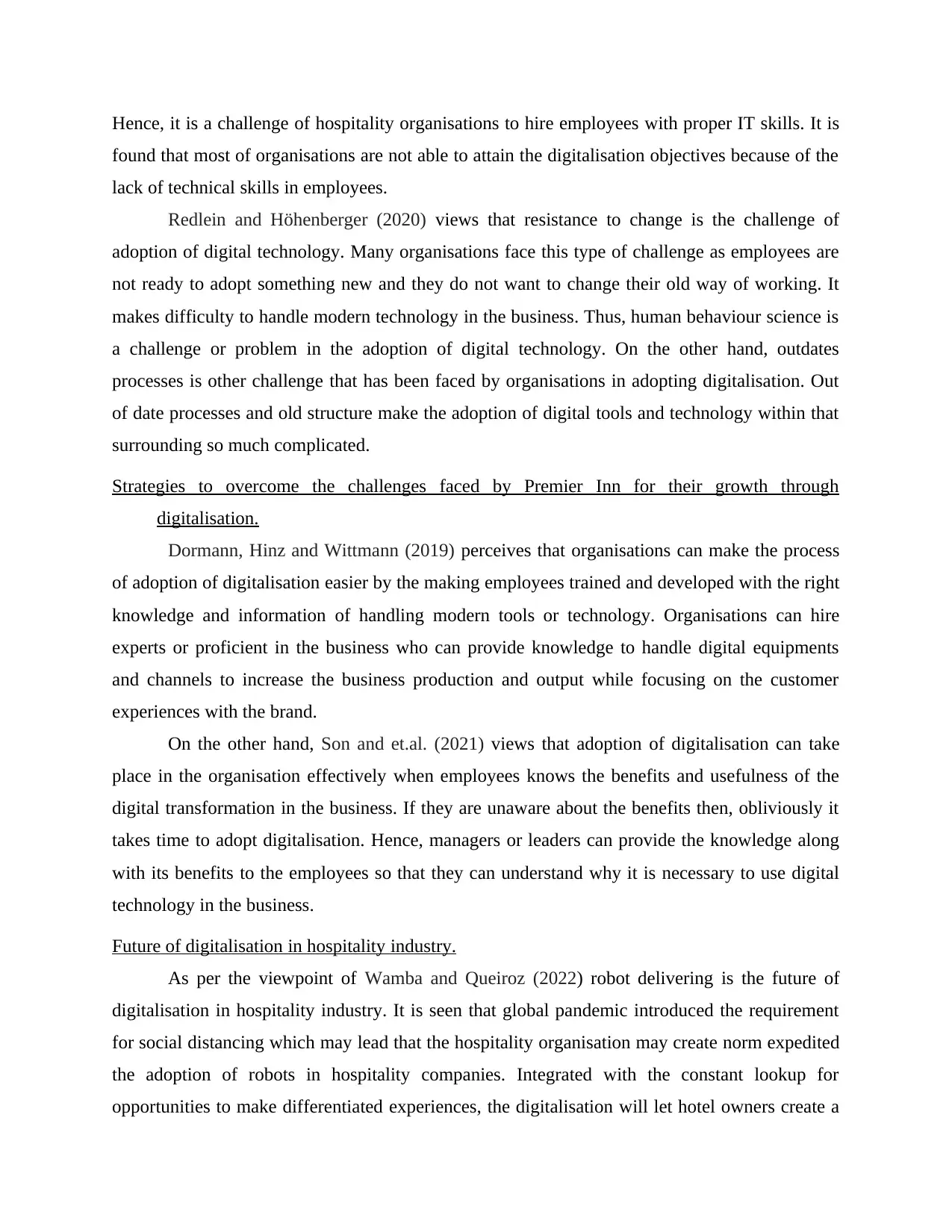
Hence, it is a challenge of hospitality organisations to hire employees with proper IT skills. It is
found that most of organisations are not able to attain the digitalisation objectives because of the
lack of technical skills in employees.
Redlein and Höhenberger (2020) views that resistance to change is the challenge of
adoption of digital technology. Many organisations face this type of challenge as employees are
not ready to adopt something new and they do not want to change their old way of working. It
makes difficulty to handle modern technology in the business. Thus, human behaviour science is
a challenge or problem in the adoption of digital technology. On the other hand, outdates
processes is other challenge that has been faced by organisations in adopting digitalisation. Out
of date processes and old structure make the adoption of digital tools and technology within that
surrounding so much complicated.
Strategies to overcome the challenges faced by Premier Inn for their growth through
digitalisation.
Dormann, Hinz and Wittmann (2019) perceives that organisations can make the process
of adoption of digitalisation easier by the making employees trained and developed with the right
knowledge and information of handling modern tools or technology. Organisations can hire
experts or proficient in the business who can provide knowledge to handle digital equipments
and channels to increase the business production and output while focusing on the customer
experiences with the brand.
On the other hand, Son and et.al. (2021) views that adoption of digitalisation can take
place in the organisation effectively when employees knows the benefits and usefulness of the
digital transformation in the business. If they are unaware about the benefits then, obliviously it
takes time to adopt digitalisation. Hence, managers or leaders can provide the knowledge along
with its benefits to the employees so that they can understand why it is necessary to use digital
technology in the business.
Future of digitalisation in hospitality industry.
As per the viewpoint of Wamba and Queiroz (2022) robot delivering is the future of
digitalisation in hospitality industry. It is seen that global pandemic introduced the requirement
for social distancing which may lead that the hospitality organisation may create norm expedited
the adoption of robots in hospitality companies. Integrated with the constant lookup for
opportunities to make differentiated experiences, the digitalisation will let hotel owners create a
found that most of organisations are not able to attain the digitalisation objectives because of the
lack of technical skills in employees.
Redlein and Höhenberger (2020) views that resistance to change is the challenge of
adoption of digital technology. Many organisations face this type of challenge as employees are
not ready to adopt something new and they do not want to change their old way of working. It
makes difficulty to handle modern technology in the business. Thus, human behaviour science is
a challenge or problem in the adoption of digital technology. On the other hand, outdates
processes is other challenge that has been faced by organisations in adopting digitalisation. Out
of date processes and old structure make the adoption of digital tools and technology within that
surrounding so much complicated.
Strategies to overcome the challenges faced by Premier Inn for their growth through
digitalisation.
Dormann, Hinz and Wittmann (2019) perceives that organisations can make the process
of adoption of digitalisation easier by the making employees trained and developed with the right
knowledge and information of handling modern tools or technology. Organisations can hire
experts or proficient in the business who can provide knowledge to handle digital equipments
and channels to increase the business production and output while focusing on the customer
experiences with the brand.
On the other hand, Son and et.al. (2021) views that adoption of digitalisation can take
place in the organisation effectively when employees knows the benefits and usefulness of the
digital transformation in the business. If they are unaware about the benefits then, obliviously it
takes time to adopt digitalisation. Hence, managers or leaders can provide the knowledge along
with its benefits to the employees so that they can understand why it is necessary to use digital
technology in the business.
Future of digitalisation in hospitality industry.
As per the viewpoint of Wamba and Queiroz (2022) robot delivering is the future of
digitalisation in hospitality industry. It is seen that global pandemic introduced the requirement
for social distancing which may lead that the hospitality organisation may create norm expedited
the adoption of robots in hospitality companies. Integrated with the constant lookup for
opportunities to make differentiated experiences, the digitalisation will let hotel owners create a
Paraphrase This Document
Need a fresh take? Get an instant paraphrase of this document with our AI Paraphraser
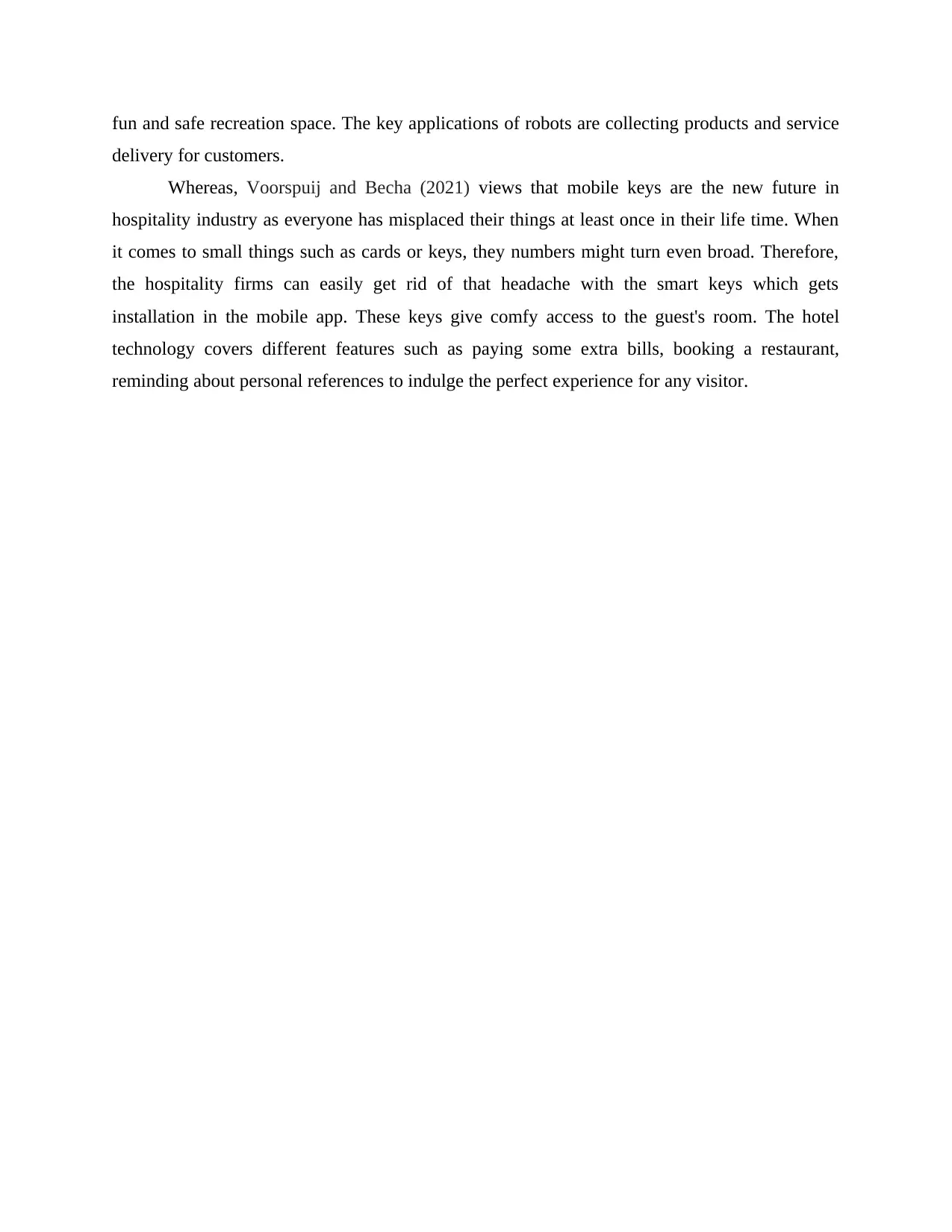
fun and safe recreation space. The key applications of robots are collecting products and service
delivery for customers.
Whereas, Voorspuij and Becha (2021) views that mobile keys are the new future in
hospitality industry as everyone has misplaced their things at least once in their life time. When
it comes to small things such as cards or keys, they numbers might turn even broad. Therefore,
the hospitality firms can easily get rid of that headache with the smart keys which gets
installation in the mobile app. These keys give comfy access to the guest's room. The hotel
technology covers different features such as paying some extra bills, booking a restaurant,
reminding about personal references to indulge the perfect experience for any visitor.
delivery for customers.
Whereas, Voorspuij and Becha (2021) views that mobile keys are the new future in
hospitality industry as everyone has misplaced their things at least once in their life time. When
it comes to small things such as cards or keys, they numbers might turn even broad. Therefore,
the hospitality firms can easily get rid of that headache with the smart keys which gets
installation in the mobile app. These keys give comfy access to the guest's room. The hotel
technology covers different features such as paying some extra bills, booking a restaurant,
reminding about personal references to indulge the perfect experience for any visitor.
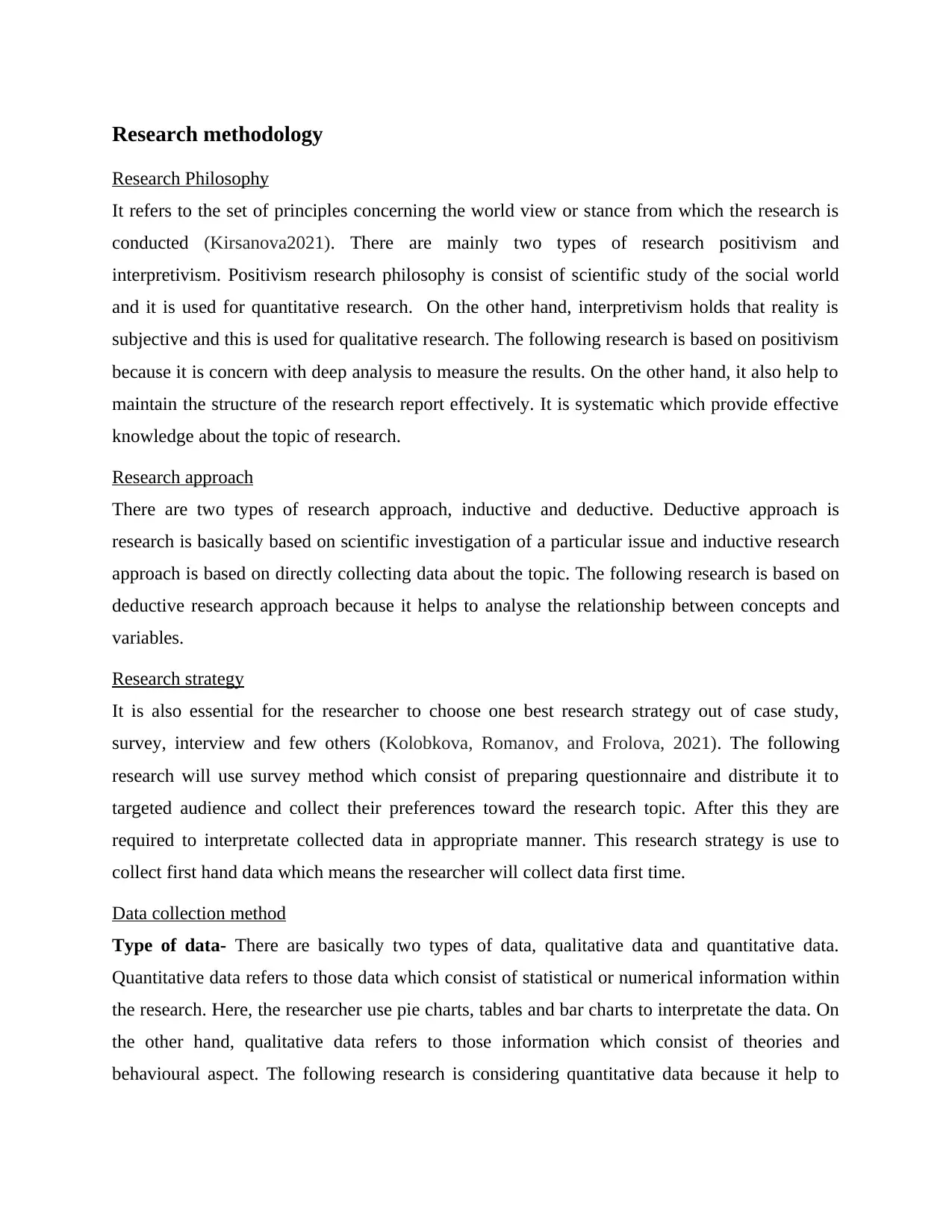
Research methodology
Research Philosophy
It refers to the set of principles concerning the world view or stance from which the research is
conducted (Kirsanova2021). There are mainly two types of research positivism and
interpretivism. Positivism research philosophy is consist of scientific study of the social world
and it is used for quantitative research. On the other hand, interpretivism holds that reality is
subjective and this is used for qualitative research. The following research is based on positivism
because it is concern with deep analysis to measure the results. On the other hand, it also help to
maintain the structure of the research report effectively. It is systematic which provide effective
knowledge about the topic of research.
Research approach
There are two types of research approach, inductive and deductive. Deductive approach is
research is basically based on scientific investigation of a particular issue and inductive research
approach is based on directly collecting data about the topic. The following research is based on
deductive research approach because it helps to analyse the relationship between concepts and
variables.
Research strategy
It is also essential for the researcher to choose one best research strategy out of case study,
survey, interview and few others (Kolobkova, Romanov, and Frolova, 2021). The following
research will use survey method which consist of preparing questionnaire and distribute it to
targeted audience and collect their preferences toward the research topic. After this they are
required to interpretate collected data in appropriate manner. This research strategy is use to
collect first hand data which means the researcher will collect data first time.
Data collection method
Type of data- There are basically two types of data, qualitative data and quantitative data.
Quantitative data refers to those data which consist of statistical or numerical information within
the research. Here, the researcher use pie charts, tables and bar charts to interpretate the data. On
the other hand, qualitative data refers to those information which consist of theories and
behavioural aspect. The following research is considering quantitative data because it help to
Research Philosophy
It refers to the set of principles concerning the world view or stance from which the research is
conducted (Kirsanova2021). There are mainly two types of research positivism and
interpretivism. Positivism research philosophy is consist of scientific study of the social world
and it is used for quantitative research. On the other hand, interpretivism holds that reality is
subjective and this is used for qualitative research. The following research is based on positivism
because it is concern with deep analysis to measure the results. On the other hand, it also help to
maintain the structure of the research report effectively. It is systematic which provide effective
knowledge about the topic of research.
Research approach
There are two types of research approach, inductive and deductive. Deductive approach is
research is basically based on scientific investigation of a particular issue and inductive research
approach is based on directly collecting data about the topic. The following research is based on
deductive research approach because it helps to analyse the relationship between concepts and
variables.
Research strategy
It is also essential for the researcher to choose one best research strategy out of case study,
survey, interview and few others (Kolobkova, Romanov, and Frolova, 2021). The following
research will use survey method which consist of preparing questionnaire and distribute it to
targeted audience and collect their preferences toward the research topic. After this they are
required to interpretate collected data in appropriate manner. This research strategy is use to
collect first hand data which means the researcher will collect data first time.
Data collection method
Type of data- There are basically two types of data, qualitative data and quantitative data.
Quantitative data refers to those data which consist of statistical or numerical information within
the research. Here, the researcher use pie charts, tables and bar charts to interpretate the data. On
the other hand, qualitative data refers to those information which consist of theories and
behavioural aspect. The following research is considering quantitative data because it help to
⊘ This is a preview!⊘
Do you want full access?
Subscribe today to unlock all pages.

Trusted by 1+ million students worldwide

include exact information with full validity and reliability. With the help of charts and tables the
findings will look attractive and easy to understand by readers.
Sampling method- There are various kinds of sampling method such as random sampling,
systematic sampling, convenience sampling, cluster sampling and stratified sampling (Punzon,
2021). The following research is based on random sampling because here, each sample has an
equal probability of being chosen. The sample size of the respondent is 30.
Target group- It is also essential for an researcher to choose those respondents who are related
to same industry and organisation. Hence, the main targeted groups for the research are
employees of Premier Inn hotels and customers of hospitality industry.
Choices of method
There are three choices of method within a research, mono, mixed and multi- mixed. The
researcher will adopt mono choice because it is simple and help the researcher to choose only
one option out of qualitative and quantitative. Here, researcher is required to choose either
qualitative or quantitative.
Time horizons
There are two types of time horizon within a research, longitudinal and cross-sectional.
Longitudinal time horizon states that researcher need more than one year to complete a
researcher and cross-sectional consist to complete a research within a short period of time
(Ratten, Tajeddini, and Merkle, 2019). The following research is conducted through cross-
sectional time horizon because it help the researcher to include updated data within the research
report.
Data collection and analysis
Here, the researcher is required to make a choice between primary data and secondary data as
well as qualitative data and quantitative data (Scholl-Grissemann, Kallmuenzer, and Peters,
2021). The following research is based on primary data where researcher will collect data first
time and on the other hand, quantitative data is adopted where researcher will use charts and
tables to interpretate the collected data. The procedure of data collection and analysis is
mentioned below-
1. Preparing a questionnaire which contain the questions related to topic.
2. Researcher will distribute the questionnaire to targeted audience.
findings will look attractive and easy to understand by readers.
Sampling method- There are various kinds of sampling method such as random sampling,
systematic sampling, convenience sampling, cluster sampling and stratified sampling (Punzon,
2021). The following research is based on random sampling because here, each sample has an
equal probability of being chosen. The sample size of the respondent is 30.
Target group- It is also essential for an researcher to choose those respondents who are related
to same industry and organisation. Hence, the main targeted groups for the research are
employees of Premier Inn hotels and customers of hospitality industry.
Choices of method
There are three choices of method within a research, mono, mixed and multi- mixed. The
researcher will adopt mono choice because it is simple and help the researcher to choose only
one option out of qualitative and quantitative. Here, researcher is required to choose either
qualitative or quantitative.
Time horizons
There are two types of time horizon within a research, longitudinal and cross-sectional.
Longitudinal time horizon states that researcher need more than one year to complete a
researcher and cross-sectional consist to complete a research within a short period of time
(Ratten, Tajeddini, and Merkle, 2019). The following research is conducted through cross-
sectional time horizon because it help the researcher to include updated data within the research
report.
Data collection and analysis
Here, the researcher is required to make a choice between primary data and secondary data as
well as qualitative data and quantitative data (Scholl-Grissemann, Kallmuenzer, and Peters,
2021). The following research is based on primary data where researcher will collect data first
time and on the other hand, quantitative data is adopted where researcher will use charts and
tables to interpretate the collected data. The procedure of data collection and analysis is
mentioned below-
1. Preparing a questionnaire which contain the questions related to topic.
2. Researcher will distribute the questionnaire to targeted audience.
Paraphrase This Document
Need a fresh take? Get an instant paraphrase of this document with our AI Paraphraser
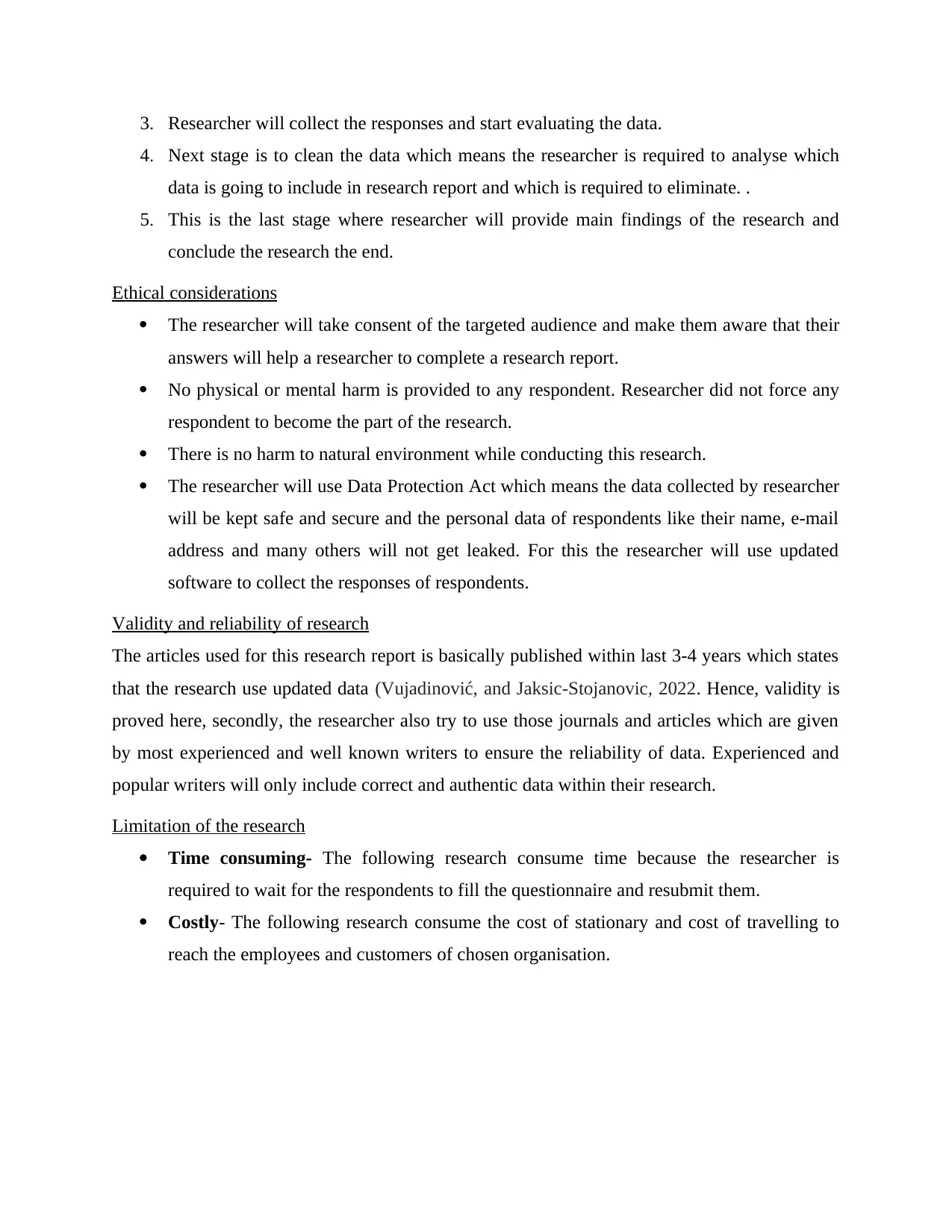
3. Researcher will collect the responses and start evaluating the data.
4. Next stage is to clean the data which means the researcher is required to analyse which
data is going to include in research report and which is required to eliminate. .
5. This is the last stage where researcher will provide main findings of the research and
conclude the research the end.
Ethical considerations
The researcher will take consent of the targeted audience and make them aware that their
answers will help a researcher to complete a research report.
No physical or mental harm is provided to any respondent. Researcher did not force any
respondent to become the part of the research.
There is no harm to natural environment while conducting this research.
The researcher will use Data Protection Act which means the data collected by researcher
will be kept safe and secure and the personal data of respondents like their name, e-mail
address and many others will not get leaked. For this the researcher will use updated
software to collect the responses of respondents.
Validity and reliability of research
The articles used for this research report is basically published within last 3-4 years which states
that the research use updated data (Vujadinović, and Jaksic-Stojanovic, 2022. Hence, validity is
proved here, secondly, the researcher also try to use those journals and articles which are given
by most experienced and well known writers to ensure the reliability of data. Experienced and
popular writers will only include correct and authentic data within their research.
Limitation of the research
Time consuming- The following research consume time because the researcher is
required to wait for the respondents to fill the questionnaire and resubmit them.
Costly- The following research consume the cost of stationary and cost of travelling to
reach the employees and customers of chosen organisation.
4. Next stage is to clean the data which means the researcher is required to analyse which
data is going to include in research report and which is required to eliminate. .
5. This is the last stage where researcher will provide main findings of the research and
conclude the research the end.
Ethical considerations
The researcher will take consent of the targeted audience and make them aware that their
answers will help a researcher to complete a research report.
No physical or mental harm is provided to any respondent. Researcher did not force any
respondent to become the part of the research.
There is no harm to natural environment while conducting this research.
The researcher will use Data Protection Act which means the data collected by researcher
will be kept safe and secure and the personal data of respondents like their name, e-mail
address and many others will not get leaked. For this the researcher will use updated
software to collect the responses of respondents.
Validity and reliability of research
The articles used for this research report is basically published within last 3-4 years which states
that the research use updated data (Vujadinović, and Jaksic-Stojanovic, 2022. Hence, validity is
proved here, secondly, the researcher also try to use those journals and articles which are given
by most experienced and well known writers to ensure the reliability of data. Experienced and
popular writers will only include correct and authentic data within their research.
Limitation of the research
Time consuming- The following research consume time because the researcher is
required to wait for the respondents to fill the questionnaire and resubmit them.
Costly- The following research consume the cost of stationary and cost of travelling to
reach the employees and customers of chosen organisation.
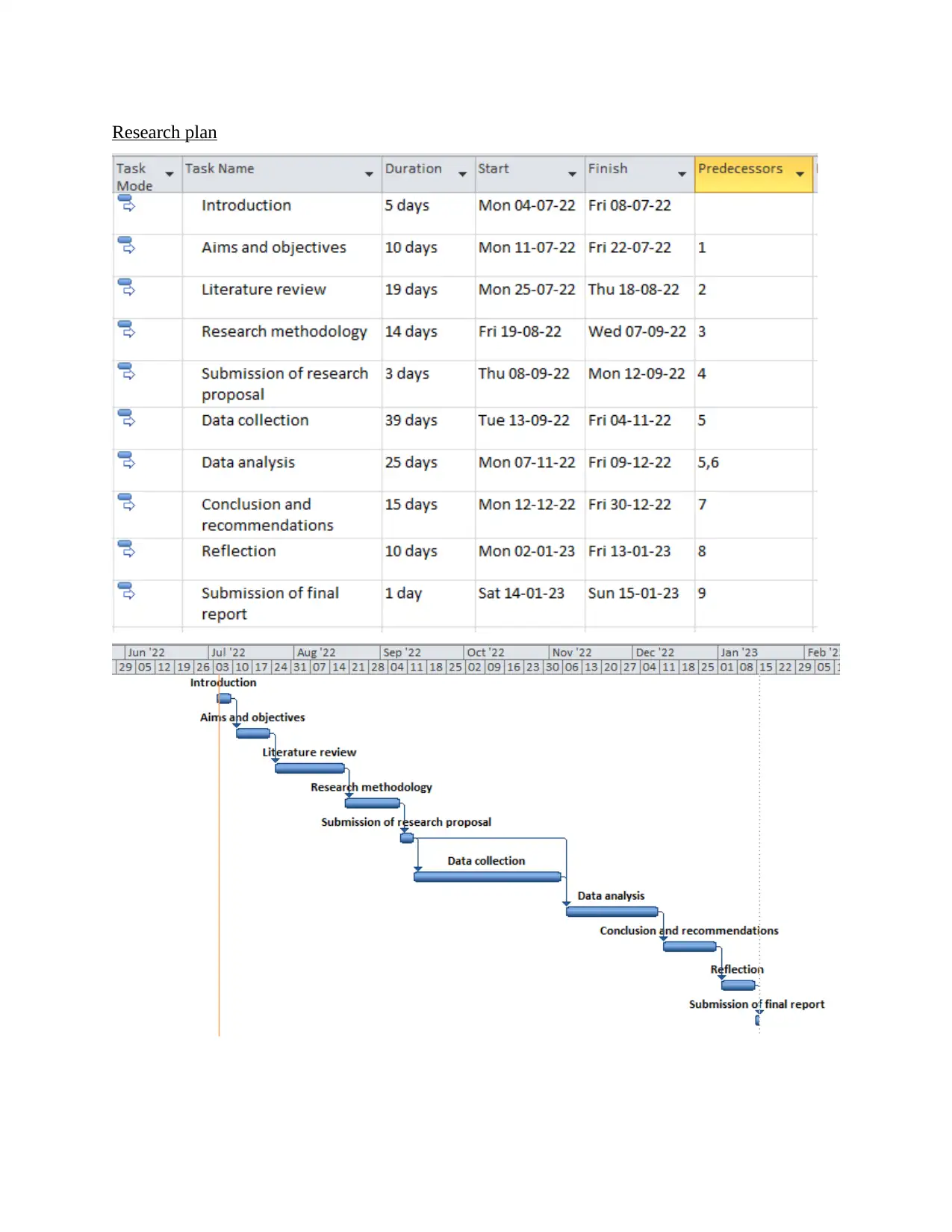
Research plan
⊘ This is a preview!⊘
Do you want full access?
Subscribe today to unlock all pages.

Trusted by 1+ million students worldwide
1 out of 15
Related Documents
Your All-in-One AI-Powered Toolkit for Academic Success.
+13062052269
info@desklib.com
Available 24*7 on WhatsApp / Email
![[object Object]](/_next/static/media/star-bottom.7253800d.svg)
Unlock your academic potential
Copyright © 2020–2026 A2Z Services. All Rights Reserved. Developed and managed by ZUCOL.



